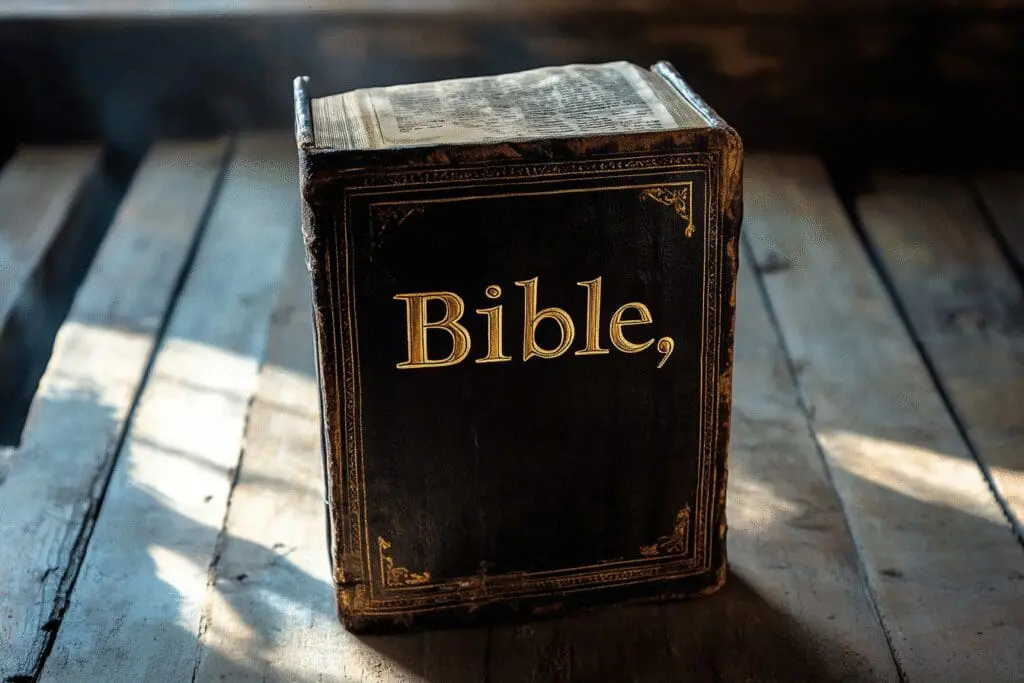Have you ever paused while writing an email? Or maybe a blog post? You type the word “bible” and a little doubt creeps in. Should that ‘b’ be a big ‘B’? I’ve been there. In fact, I remember asking my pastor about it years ago. He smiled and said the answer is both simple and surprisingly deep. It’s a question of respect. Not just for grammar, but for the Word itself. So, do you capitalize Bible?
The short answer is yes. You almost always capitalize it. But there is a shocking exception. A time when using a lowercase ‘b’ is actually correct. This guide will walk you through everything. We will explore the rules. We will see why they matter. And we will honor God’s Word in our writing.
More in Bible Category
How Do You Write a Bible Verse
Why Is Song of Solomon in the Bible
Key Takeaways
- Capitalize “Bible”: When referring to the Christian holy scriptures, always use a capital “B”. The same rule applies to other holy books like the Quran or Torah.
- The Big Exception: Do not capitalize “bible” when using it as a generic term. For example, “That cookbook is my kitchen bible.”
- Adjectives Are Different: The adjective “biblical” is generally not capitalized unless it starts a sentence.
- It’s About Respect: Capitalization is more than a grammar rule. It is a simple way to show reverence and honor to the Holy Scripture.
What Is the Main Rule for Capitalizing the Bible?
The main rule is straightforward. You should capitalize the word “Bible”. Treat it as a proper noun. This is because it refers to a specific, unique book. The Holy Bible is the title of our sacred text. Just like you would capitalize “Moby Dick” or “The Great Gatsby.” You are naming a particular title.
I think of it this way. My name is a proper noun. It points to me specifically. The Bible is the proper name for God’s Word. It points to one specific collection of books. Using a capital letter acknowledges its unique status. It is not just any book. It is the Book.
Why Does the Bible Get Treated as a Proper Noun?
A proper noun names a specific person, place, or thing. “Bible” fits this perfectly.
- It names a specific religious text.
- It is recognized globally by this title.
- It refers to the Christian scriptures.
This isn’t just a Christian practice. Major style guides agree. The Chicago Manual of Style and the AP Stylebook both say to capitalize it. They recognize “Bible” as the formal name of a religious work. It stands apart from all other books. Therefore, it gets a capital letter.
Should I Always Capitalize the Full Title, Holy Bible?
Yes, you should. The term “Holy Bible” is the full, formal title. Both words are part of the title. So, both words should be capitalized. Think of it like a person’s full name. You would write “John Smith,” not “John smith.”
Treating the full title with this respect is important. It constantly reminds us of the book’s nature. It is not just the Bible. It is the Holy Bible. Set apart by God. Given to us for teaching and guidance. Every time we write its full name, we get a chance to honor its sacredness. It’s a small act of worship.
Is There Ever a Time When You Don’t Capitalize Bible?
Here is the shocking truth from the title. Yes, there is one specific time. You do not capitalize the word “bible” when it is used generically. This happens when the word describes a book that is an ultimate authority on a subject. But it is not the Holy Bible.
I saw this just the other day. I was reading a magazine about car repair. The author called his service manual “the mechanic’s bible.” In that case, the lowercase “b” was correct. He was not talking about the Word of God. He was using the word as a metaphor. He meant the manual was his ultimate guide for fixing cars.
What Are Some Examples of Using “bible” as a Common Noun?
This might seem confusing at first. But a few examples make it clear. You can see the pattern easily. The word is being used to mean “a comprehensive guidebook.”
- “For any serious chef, that cookbook is the kitchen bible.”
- “He read the company’s style guide, the official bible for all marketing materials.”
- “She carried her copy of the fishing regulations, calling it her fishing bible.”
In each case, the word “bible” is not the proper name of the book. It is a descriptive term. It shows the book’s importance to a specific person or group. This is the only context where a lowercase “b” is the right choice.
How Can I Tell the Difference When I Am Writing?
It is easy to tell the difference. Just ask yourself one simple question. Am I talking about the Holy Scripture?
If the answer is yes, use a capital “B”. If you are talking about God’s Word, the Old Testament, or the New Testament, capitalize it.
If the answer is no, use a lowercase “b”. If you are using the word as a shortcut for “the ultimate handbook” on a topic like gardening or investing, do not capitalize it. This simple test works every time. It keeps your writing clear. And it ensures you are showing respect where it is due.
What About Capitalizing Words Related to the Bible?
This is a great question. We do not just write the word “Bible.” We also use related terms. Words like “biblical” and “scriptural.” Do these words follow the same rules? The answer is generally no. These related words have their own guidelines.
Understanding them helps your writing become even more precise. It shows you have a deep understanding of the topic. Let’s look at the most common related words. We can break them down one by one.
Does the Adjective “Biblical” Need a Capital Letter?
Usually, “biblical” does not need a capital letter. It is an adjective. Most adjectives are not capitalized in English. The only exception is when the adjective comes from a proper noun. For instance, we capitalize “Shakespearean” because it comes from “Shakespeare.”
However, “biblical” has become a common word. It is widely used in the English language. So, most style guides say to keep it lowercase.
- You would write about a storm of “biblical proportions.”
- You might discuss “biblical history” in a class.
- Someone might have a “biblical knowledge” of a topic.
The only time you would capitalize it is at the beginning of a sentence. For example: “Biblical stories have inspired people for centuries.” This is just the standard rule for starting any sentence.
How Should I Handle the Word “Scripture” or “Scriptural”?
The word “Scripture” is very similar to “Bible.” When it refers to the sacred writings of a religion, you should capitalize it. This is true for Christianity and other faiths.
- “The pastor based his sermon on a passage of Scripture.”
- “Devout Muslims study the holy Scripture of the Quran.”
When you use the word generically to mean “writings,” it stays lowercase. This is much less common. For example: “The museum displayed ancient scriptures from the lost city.”
The adjective “scriptural” follows the same rule as “biblical.” It remains lowercase unless it starts a sentence. For example: “He made a strong scriptural argument for his position.”
What Do the Official Style Guides Say About This?
It is always helpful to see what the experts say. Major writing style guides provide rules for professional writers and publishers. Their guidance helps create consistency. And on this topic, they are all in agreement. They confirm the rules we have already discussed. This gives us confidence in our own writing.
Looking at these guides reinforces the “why” behind the rules. It is about clarity and respect for sacred texts. These are universal principles in good writing. Purdue University’s Online Writing Lab offers a great summary of these rules. They explain that names of sacred books are capitalized. This resource from Purdue University is a helpful reference for many capitalization questions.
What Is the Rule in the Chicago Manual of Style?
The Chicago Manual of Style is a top guide for publishing. It is used by countless authors and editors. Its rule is very clear.
- Capitalize “Bible” and “Scripture” when referring to the holy books.
- Capitalize other names for the Bible, like the “Word of God” or “Holy Writ.”
- Keep the adjective “biblical” lowercase.
This guide sets the standard for many books, magazines, and academic papers. Following its lead is always a safe bet. It brings a level of professionalism to your work.
Does the AP Stylebook Have the Same Guidance?
Yes, it does. The Associated Press (AP) Stylebook is used by most journalists. It is the guide for newspapers and news websites. Their rules are designed for clarity and quick reading.
The AP Stylebook agrees completely. Capitalize “Bible” when referring to the Old and New Testaments. Do not capitalize “bible” when it is used as a generic term. For example, “the fisherman’s bible.” It also advises keeping “biblical” in lowercase. So, journalists and book publishers are on the same page. This consistency is very helpful.
Why Does Getting This Right Truly Matter for a Christian?
We have covered the grammar. We have looked at the style guides. But for me, this goes much deeper. As a follower of Christ, how I treat the Bible matters. It matters in how I read it. It matters in how I live it out. And it matters in how I write about it.
This small detail of capitalization is an act of reverence. It is a way to publicly acknowledge the Bible’s authority. It is God’s inspired Word. It is not just another book on the shelf. It is living and active. It is our guide for life. Using a capital “B” is a tiny way to say all of that.
Is Capitalizing the Bible a Way of Showing Honor?
I believe it is. Our world often tries to diminish the Bible. Some treat it as a collection of myths. Others see it as an outdated moral code. When we insist on capitalizing its name, we take a stand. We are making a quiet but firm statement.
This statement says:
- This book is unique.
- This book is holy.
- This book is the ultimate authority in my life.
It is like standing up when a judge enters a courtroom. It is a small sign of respect for a greater authority. We are honoring the Author by honoring His book. It is a simple discipline that shapes our hearts. It reminds us of whose Word we are reading.
Does This Small Detail Affect My Witness to Others?
It might seem like a minor point. Will someone come to faith because I used a capital “B”? Probably not directly. But our consistency in small things matters. It shows that we take our faith seriously.
When we write with care and precision, it reflects well on us. And it reflects well on our Savior. If we are thoughtful about our grammar, maybe we are also thoughtful about our theology. It shows we care about details. Our faith is not sloppy. Our respect for God is not sloppy.
Every choice we make contributes to our witness. This includes the words we choose and the way we write them. It is one more opportunity to bring glory to God. Even in something as small as a single letter. It is a chance to put our faith into practice.
Final Thoughts on Honoring God’s Word
So, do you capitalize Bible? Yes. You do. You capitalize it because it is a proper name. The name of the most important book ever written. You do it to follow the rules of good grammar.
But you also do it for a bigger reason. You do it to honor the God who gave us His Word. It is a small act of worship. A quiet declaration that this book is different. It is holy. It is true.
The one exception, the generic “bible,” is a great reminder. It shows us how much the Bible’s identity has shaped our language. The Book is so authoritative that its very name has become a symbol for authority.
Let’s commit to getting this right. In our emails, our social media posts, and our personal notes. Let’s always give the Bible the honor it deserves. It is a small detail. But our great God is worthy of it.
Frequently Asked Questions – Do You Capitalize Bible

Why is it important to capitalize ‘Bible’ correctly?
Correct capitalization shows respect for the religious text and ensures clarity in your writing by distinguishing between the proper noun and the common noun or metaphorical use.
How can I remember when to capitalize ‘Bible’?
Remember that ‘Bible’ is capitalized when referring to the holy text as a proper noun, and not capitalized when talking about a physical book or using it as a common noun, such as in idiomatic expressions.
Are there rules in style guides about capitalizing ‘Bible’?
Yes, major style guides like the Chicago Manual of Style, AP Stylebook, and MLA Handbook agree that ‘Bible’ should be capitalized when referring to the religious text, and ‘biblical’ or related adjectives are also capitalized.
When do I not capitalize ‘bible’?
You do not capitalize ‘bible’ when referring to a physical copy of the book or using the word generically to mean any book or guide on a certain topic, as it then functions as a common noun.
Should I capitalize ‘Bible’ when referring to the holy scripture of Christianity?
Yes, you should capitalize ‘Bible’ when you are talking about the special, holy text of Christianity, as it is a proper noun and the official name of a specific religious book.




